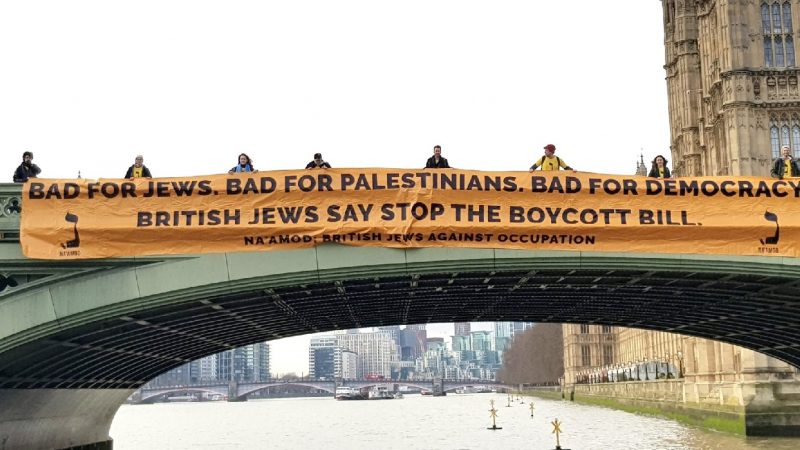'Bad for Jews. Bad for Palestinians. Bad for democracy.'

Jewish campaign group Na’amod staged a protest today over government proposals to stop public sector organisations from undertaking boycotts of Israel. Campaigners dropped a giant banner reading ‘Bad for Jews. Bad for Palestinians. Bad for democracy. British Jews say stop the Boycott Bill.’ over Westminster Bridge.
Na’amod describes itself as “a growing movement of British Jews working to mobilise our community in support of freedom, equality and justice for all Palestinians and Israelis, and to bring an end to our community’s support for the occupation.”
Speaking on the action, Na’amod activist and organiser of the action, Imogen Philips said: “We came to Westminster today to protest the Government’s alarming attempts to use Jews as a justification for their draconian legislation. Dismantling antisemitism will never be done by silencing free speech and suppressing advocacy for Palestinian human rights. We will not stand by whilst the government instrumentalise real Jewish fears for their own anti-democratic and anti-Palestinian agenda.
“Palestinian freedom and Jewish safety are not mutually exclusive goals. We must fight antisemitism in tandem with dismantling Israeli occupation.”
First touted by the Tories in 2016, the ‘Boycott Bill’ is proposed legislation which would be designed to prevent public bodies, such as local councils, from boycotting companies on ethical grounds. It is thought that this is intended to target boycotts of Israeli goods, in response to the global Boycott, Divestment and Sanctions (BDS) campaign. The proposed Bill is reportedly intended to require all public institutions to support UK foreign policy through its spending and investments, and could make it illegal for local authorities to divest from Israeli arms manufacturers.
BDS is an international movement which seeks to pressure Israel to withdraw from its occupation of Palestine and the Syrian Golan Heights, guarantee rights for Arab citizens of Israel and ensure that Palestinian refugees are given the right of return to their homes. The movement was launched in 2005, following a call from over 100 Palestinian civil society organisations. BDS campaigners say the movement is inspired by the international campaigns against apartheid in South Africa.
Plans for the ‘Boycott Bill’ legislation were formally announced in the 2022 Queen’s Speech, when the government – then led by Boris Johnson – announced its legislative programme for the year. In the Queen’s Speech, it was said that the legislation would “prevent public bodies engaging in boycotts that undermine community cohesion”, and the government has defended its plans by suggesting the bill would help combat antisemitism.
The proposed legislation has faced fierce resistance from civil society groups, more than 50 of which have signed a statement condemning the proposals. Environmental, human rights and social justice charities Friends of the Earth, Greenpeace, Liberty, People & Planet and War on Want are among the signatories, as are trade unions RMT, ASLEF, BFAWU, TSSA, Unison, UCU, Unite, PCS and the CWU. Several Jewish groups – including Na’amod, Jewish Solidarity Action and Jews for Justice for Palestinians – have also signed the statement.
The statement reads: “If passed, this law will stifle a wide range of campaigns concerned with the arms trade, climate justice, human rights, international law, and international solidarity with oppressed peoples struggling for justice. The proposed law presents a threat to freedom of expression, and the ability of public bodies and democratic institutions to spend, invest and trade ethically in line with international law and human rights.”
The ‘Boycott Bill’ has not yet been introduced in parliament.
Chris Jarvis is head of strategy and development at Left Foot Forward
To reach hundreds of thousands of new readers we need to grow our donor base substantially.
That's why in 2024, we are seeking to generate 150 additional regular donors to support Left Foot Forward's work.
We still need another 117 people to donate to hit the target. You can help. Donate today.



